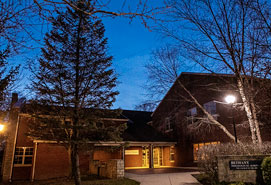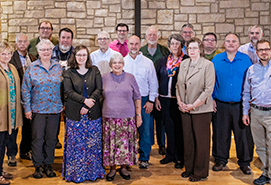As the core of the master of divinity (MDiv) program, Ministry Formation serves to integrate experience and academics. Among the vocations which MDiv students explore through Ministry Formation are congregational ministry, theological education, chaplaincy, social service, and a variety of denominational and ecumenical staff positions.
Centrality of Ministry Formation
The MDiv curriculum presupposes the centrality of ministry formation, to which the rest of the curricular program contributes in various ways. The ministry formation process provides (1) opportunities for students to bring together ministry experience in multiple contexts, (2) supervised reflection designed to enhance that experience, and (3) academic course work which informs this reflection.
Ministry Formation is rooted in the praxis of ministry, a process of learning ministry by doing ministry. To that end, students participate in two required ministry experiences in two different ministry contexts. The reflective process related to these experiences involves faculty, supervisor, and peers and is designed to lead students to an integration of personal and professional identity, and academic and practical proficiency. The process also enhances the student’s ability to articulate faith within concrete life experiences and the changing dynamics of today’s world. (Note: an additional course in ministry studies may be substituted for the second experience, in conversation with faculty.)
Curricular Components of Ministry Formation
EXPLORING THE CALL: FOUNDATIONS FOR MINISTERIAL LEADERSHIP (F580)
This course, taken during the first year, explores both the call and identity of the minister and the cultural context in which specific ministries take shape. Students are required to participate in a spiritual formation group that meets weekly. Students explore the various aspects of Christian ministry with particular attention to pastoral/congregational ministry. Course texts, focused on spiritual development, the missional leader, and pastoral ministry, encourage students to explore social situations of congregational ministries as well as the social and spiritual shaping of students’ identities as ministers. Students engage in theological reflection through practicing traditional spiritual disciplines. Class presentations and discussions, specific readings, small group work, ministry site visits, and an in-depth interview with a person practicing a specific ministry press students to engage specific examples of ministry and their own understanding of ministry with theological reflection. (6 credit hours for the year)
Ministry Formation (F701)
Each student participates in an eight- to nine-month part-time ministry placement in an approved congregation or other ministry setting, concurrent with two semesters of classwork, often during the middler year. This supervised experience provides the basis for reflection in a Ministry Formation group. The class component consists of block course with a synchronous video option in both semesters. This is a six-hour course offered in a year-long format. (3 credit hours per semester)
Ministry Formation Elective (F600, F601, or F602)
In addition to the Ministry Formation courses described above, three hours of credit are granted for the second required field education experience and related reflection process. It takes place in a different ministry context than that of the middler year placement and may take place at various times during the program. Examples include the following:
- Intern year – Nine to twelve months of full-time ministry, following the guidelines of the Intern Syllabus.
- Clinical pastoral education (CPE) – A basic unit of CPE offered by an agency accredited by the Association for Clinical Pastoral Education (ACPE).
- Summer ministry – Ten weeks of full-time ministry and reflection as outlined in the Summer Ministry Syllabus.
- Extended ministry – The equivalent of ten weeks of full-time ministry and reflection, spread over a longer period of time.
- Prior ministry experience – Credit for ministry experience within the three years preceding admission to Bethany, when the nature of the experience warrants such credit. Requirements for receiving credit for prior ministry experience are outlined in the Bethany Student Handbook.
MDiv Review (F902)
This course, often taken during the senior year, is designed to synthesize and reflect upon each student’s cumulative course work and field education experience. In preparation for this course, each student assembles a portfolio of representative papers and reports from prior courses and ministry placements. The course culminates in an interview with each student by a faculty committee to assess the student’s fulfillment of the objectives of the MDiv program. (Three credit hours)
For more information about Ministry Formation at Bethany, refer to the Bethany Academic Catalog.








 Green Circle: Bethany invests in 100% renewable energy.
Green Circle: Bethany invests in 100% renewable energy.